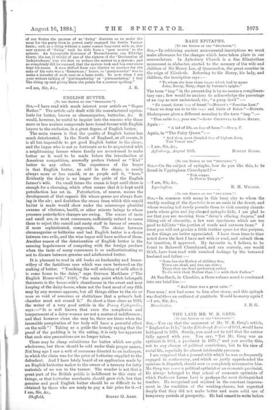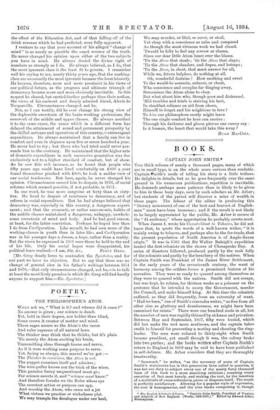THE LATE MR. W. R. GREG.
[To THE EDITOR OF THE "SPECTATOR."] SIR,—You say that the argument of Mr. W. R. Greg's article, " England as It Is," in the Edinburgh Review of 1851, would have held good in 1876. Surely, you need not be told that the author fully agreed with you. You say, "Yet Mr. Greg was an optimist in 1851, a pessimist in 1878 ;" and you ascribe this, not to any change of political convictions, but to his view of social life, especially its almost intolerable pressure.
I am surprised that a journal with which he was so frequently engaged in controversy, and which so justly apprehended the opinions it disputed, should now so completely misconceive him. Mr. Greg was never a political optimist or an economic pessimist. He always belonged to that school of economic optimists of which Professor Leone Levi is perhaps the most distinguished teacher. He recognised and rejoiced in the constant improve- ment in the condition of the working classes, but regretted deeply that they did not make better and more solid use of temporary periods of prosperity. He had ceased to write before
the effect of the Education Act, and of that falling-off of the drink revenue which he had predicted, were fully apparent.
I venture to say that your account of his alleged "change of mind " is as nearly as possible the exact reverse of the truth. He never changed his opinion upon either of the two subjects you have in mind. He always denied the divine right of numbers as strongly as I do. He always believed, as I do,that the most ignorant class is the least fit to govern. I remember well his saying to me, nearly thirty years ago, that the working- class are necessarily the most ignorant because the least leisurely. He became, therefore, more and more pessimist in his views of our political future, as the progress and ultimate triumph of democracy became more and more obviously inevitable. In this respect he shared, but carried further perhaps than their author, the views of his eminent and deeply admired friend, Alexis de Tocqueville. Circumstances changed, not he.
Nor, as I can testify, did he ever change his strong view of the deplorable overstrain of the brain-working professions, the overwork of the middle and upper classes. He always ascribed it to the same cause, the cause which in a different form has delayed the attainment of sound and permanent prosperity by the skilled artisans and operatives of this country,—extravagant expenditure. He always maintained that a family can live in comfort and even in elegance upon five or seven hundred a year. He never had to try ; but those who had tried could never per- suade him to the contrary. He maintained that the higher rate of domestic expenditure in each successive generation was due exclusively not to a higher standard of comfort, but of show. As he saw this evil increase, as he found that people who fifty years ago could have lived comfortably on £400 a year found themselves pinched with £800, he took a sadder view of our social tendencies. But here, again, he never changed his opinion. Circumstances caused him to despair, in 1876, of social reforms which seemed possible, if not probable, in 1851.
In one word, he was more sanguine at forty than at sixty- five. He lived to despair of resistance to democracy, and of reform in social expenditure. But he had always believed that democracy was, especially in this country, a dangerous experi- ment; and that the economic, or rather uneconomic, habits of the middle classes maintained a dangerous, unhappy, unwhole- some overstrain of mind and body. And he had good reason, at least, for the latter conviction. Perhaps he hoped less than I do from Co-Operation. Like myself, he had seen more of the working-classes in youth than in later life ; and Co-Operation was in his younger days a dream, a hope, rather than a reality. But the views he expressed in 1851 were those he held to the end of his life. Only his social hopes were disappointed, his political fears realised.—I am, Sir, &c., PERCY GREG. [Mr. Greg dearly loves to contradict the Spectator, and for our part we have no objection. But to say that there was no change of general view in his father's writings between 1851 and 1878,—that only circumstances changed, not to talk at least the most lively paradox in which Mr. Greg will find hardly anyone to support him.—En. Spectator.]



































 Previous page
Previous page